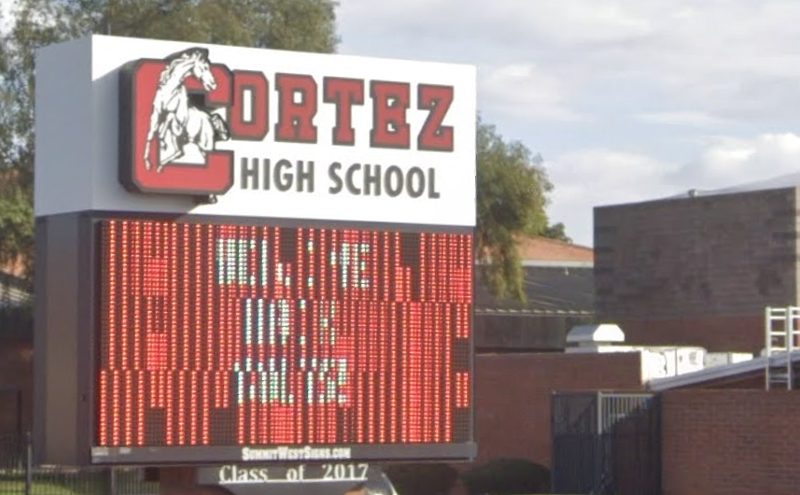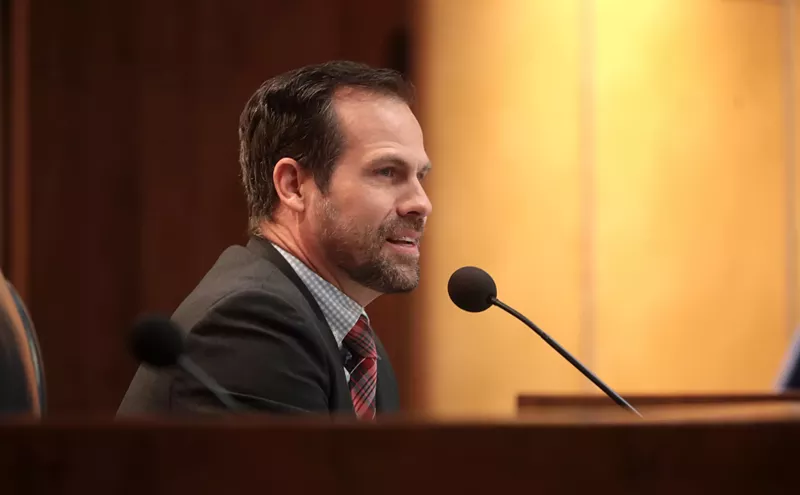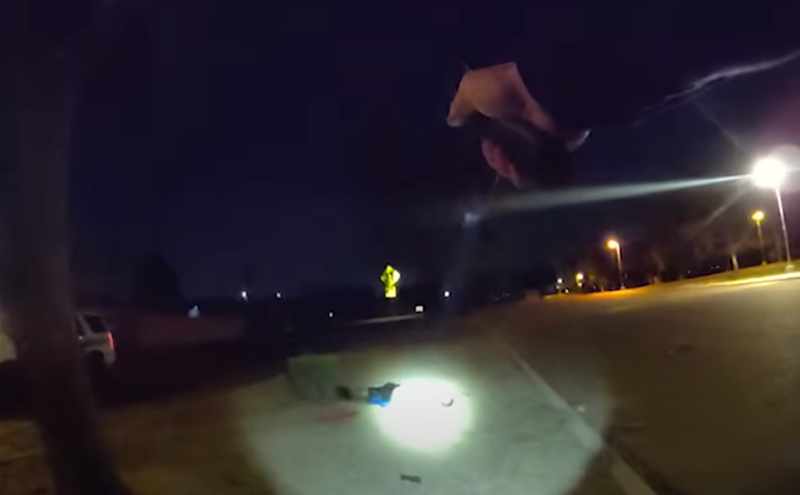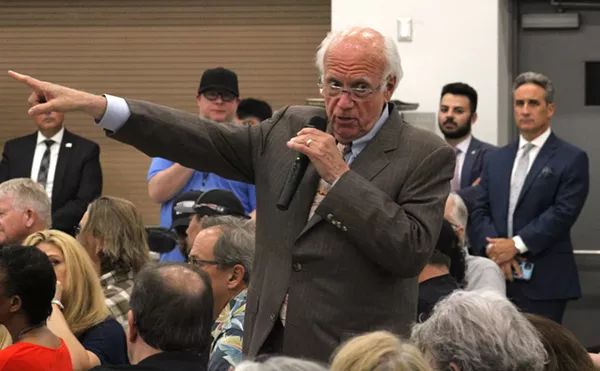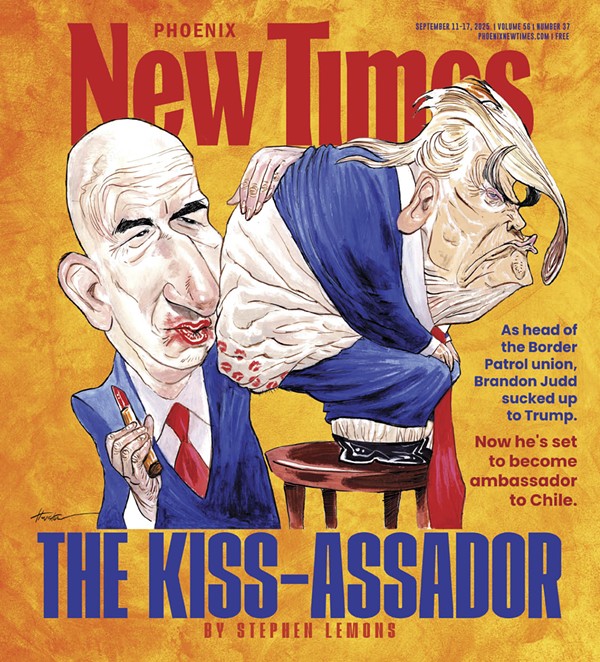It's now appallingly apparent that County Attorney Andrew Thomas is skirting the serious problems gripping the Maricopa County Elections Department.
I had hoped Thomas would conduct a thorough investigation of the elections department, part of the County Recorder's Office, in the wake of last fall's District 20 primary recount fiasco that exposed vast problems with mail-in voting that accounts for more than 50 percent of the ballots cast in county elections.
The recount revealed significant problems with the county's optical scanning equipment used to read mail-in ballots. Variances of up to 18 percent in the number of votes read by the machines cast serious doubt on the county's ability to hold valid elections.
The county Republican Committee requested last January that Thomas conduct an investigation into the elections department's handling of the District 20 recount based on information I uncovered last fall ("Election Eve Nightmare," October 14, 2004).
Thomas complied with the committee's request and launched what his office called a "preliminary investigation" of the recount controversy ("Litmus Test," February 17, 2005).
A better term for the so-called preliminary investigation would have been "whitewash."
According to records I obtained from the County Attorney's Office under the Arizona Public Records Law, Thomas allowed his minions to conduct a half-assed probe in which investigators failed to interview crucial witnesses -- including county elections director Karen Osborne.
How in the hell can you conduct an investigation of the elections department without interviewing the boss?!
Even more troubling is the fact that Thomas' investigators did uncover evidence of a conspiracy between county election officials and a private vendor to hide crucial information from a Superior Court judge that an optical scanner may have malfunctioned during the District 20 recount.
In other words, Thomas had evidence before him that county elections officials tampered with the outcome of an election. Yet the newly elected county attorney decided to drop the investigation.
With evidence of a conspiracy to defraud voters, a real prosecutor would have unleashed a pack of legal pit bulls on the elections department to plow through every file cabinet, e-mail and hard drive in the office.
Instead, Thomas, who lacks any significant prosecutorial experience, terminated the investigation, saying there was no evidence of criminal wrongdoing.
I had hoped Thomas would have dived into the elections department problems and proved wrong critics who predicted he would place politics ahead of fair and evenhanded prosecutions. Thomas wanted the appearance of an investigation, but he was unwilling to publicly embarrass County Recorder Helen Purcell, a fellow high-ranking Republican in county government.
Thomas turned the inquiry over to two of his top political aides, Tim La Sota and Barnett Lotstein. Information gathered by them indicates that Osborne and her minions worked vigorously to suppress evidence during a crucial hearing last September 23 before Maricopa County Superior Court Judge Eddward Ballinger. Their actions constitute a serious breach of public trust.
The one-day emergency hearing took place to certify the results of the District 20 Republican state House primary election. Anton Orlich had defeated John McComish by four votes in the September 7 primary. The narrow margin of victory triggered an automatic recount. But when the recount was conducted a few weeks later, 489 new votes suddenly appeared, nearly all of which came from early, mail-in ballots.
This time, McComish had 13 more votes than Orlich.
Orlich challenged the recount results, claiming the elections department improperly handled the ballots before the recount, and that the sudden appearance of 489 votes indicated a voting machine had malfunctioned during the recount.
The surge of votes represented a stunning 18.3 percent jump in the total votes tallied on one machine from the primary to the recount.
Orlich's attorney, Lisa Hauser, subpoenaed Tina Polich, an employee of Elections Systems and Software Inc., to testify about the operation of the company's optical scanners. Polich never showed up for the hearing -- which greatly upset Judge Ballinger.
"It's very unfortunate that your witness is not here [after being] duly served," Ballinger told Hauser. "That's very disturbing."
What Ballinger didn't know at the time was that county elections officials made sure Polich wouldn't show up at the hearing.
Her absence left Ballinger with no choice but to certify the election in favor of McComish, who subsequently won the seat in the District 20 general election.
Osborne, her chief assistant Mitch Etter, assistant county attorney Jill Kennedy and representatives of Elections Systems and Software brazenly took steps to keep Polich from testifying.
Here's what happened:
On the afternoon of September 22, a process server delivered a subpoena to Polich's office inside the Maricopa County elections department. Polich was not present, but the subpoena was accepted by Etter.
Etter told county investigators on February 8 that he placed the subpoena on Polich's desk. He also said he called his boss, Karen Osborne, and told her about the subpoena and about Polich's absence.
Osborne, Etter stated, did not direct him to take any further action.
If this is true, Osborne -- who turned down requests for an interview -- should be immediately dismissed from her post by her boss, County Recorder Purcell.
Osborne's top priority should have been to make sure that the court got all the evidence necessary to make a fair decision about the accuracy of the recount. It was obvious that Hauser wanted Polich to testify about the performance and reliability of the optical scanners.
If Osborne had the best interests of the public as her top priority, she would have instructed Etter to immediately contact Tina Polich to make sure she knew about the subpoena and demand that she appear in court the next day.
But Etter told investigators he did nothing more to notify Polich about the subpoena, claiming he only had an 800 number for her company.
Which is bullshit. Polich later told county investigators her home phone number is listed in the directory.
Etter informed investigators that he contacted Polich the next day, September 23, when the court hearing would take place. Etter stated that Polich's bosses told her not to attend the hearing because the subpoena had not been directly served on her and therefore was invalid. Polich, according to Etter, then left the office for the day and never went to court.
On February 16, eight days after investigators talked with Etter, La Sota interviewed Eric Anderson, Elections Systems and Software's attorney, who advised Polich not to appear in court. Anderson delivered stunning information that broadened the conspiracy to suppress information concerning the District 20 recount.
Anderson said he based his determination that Polich had not been properly served with the subpoena on advice he received from the county elections department's attorney, Jill Kennedy.
"[Anderson] said he spoke with Jill Kennedy . . . and that they mutually agreed that service had not been perfected and that Ms. Polich should 'lay low' for the day," states a February 21 memorandum written by La Sota.
This astounding piece of information should have triggered major alarms inside Thomas' office. Not only had Osborne failed to order Etter to make sure Polich appeared in court, now Thomas' investigators had evidence that the county elections department's attorney illegally provided advice to Elections Systems and Software to ignore the subpoena!
Kennedy denied giving legal advice to the firm concerning the subpoena in her interview with county attorney's investigators. But she admitted providing Elections Systems and Software samples of motions to quash subpoenas.
Thomas formally reprimanded Kennedy, stating that her actions "constituted the providing of legal advice, and possibly resulted in the witness not appearing in court."
On March 1, La Sota and Lotstein interviewed Polich. According to La Sota's notes of the meeting, Polich said Etter had "handed" her the subpoena and that she knew about the hearing the day before it was held. She also told investigators she was aware of its importance and that she knew she was the only employee of her company available to testify in Arizona.
Polich confirmed Etter's account that she did not attend the hearing because Anderson told her she was not required to go because of the improperly served subpoena. (County investigators note in their reports that the subpoena was properly served, by the way.)
Anderson told investigators, amazingly, that Polich would have attended the hearing if elections officials had only asked her to.
Even if that's true, Polich's appearing at the hearing was the last thing elections officials wanted.
Because her testimony would have raised serious questions about the validity of the District 20 recount and would have revealed that the county's optical scanners have serious shortcomings. This would have been a huge embarrassment to the elections department, Osborne and Purcell just six weeks before the November general election.
Polich, according to La Sota's notes of the interview, had found it possible "that there could have been a malfunction with the machine that resulted in the large discrepancy [the 18.3 percent increase in the number of votes tallied during the recount]."
It's impossible to know for certain how Judge Ballinger would have reacted to testimony by Polich. Transcripts of the September 23 hearing, however, show that her failure to appear in court was the basis for Ballinger's decision in favor of McComish.
Ballinger stated that even though he was deeply concerned about the large variation in the votes counted from the primary to the recount, his decision to validate the recount was "based primarily on the fact that [Polich] didn't show up."
The elections department's cover-up of voting-machine problems is continuing.
Elections department officials have made repeated statements to the media that the county's voting machines have been working fine. Yet County Recorder Purcell told Thomas' investigators that the elections department was very concerned about voting-machine problems that arose during the District 20 recount.
Purcell said to investigators on March 31 that two of the Elections Systems and Software optical scanners used during the primary and recount were removed from service before the general election. She also said the county was considering contracting with a new vendor to provide voting machines.
Based largely on Purcell's statements that the elections department was addressing the issue, Thomas "determined that there was not sufficient evidence of criminal conduct to justify commencing a formal criminal investigation," he said in a May 5 letter to the county Republican Committee.
A month later, the Arizona Republic quoted elections director Osborne as saying she had no problem with the voting machines: "We are going to stay with these machines. They are very solid, and they do what they are supposed to do."
Thomas was annoyed by Osborne's comments.
"This quote by Ms. Osborne directly contradicts your prior representations," Thomas wrote in a June 16 letter to Purcell.
Purcell fired back a June 24 letter assuring Thomas that the elections department was preparing to enter into a contract to upgrade the optical scanners with equipment designed to better detect marks on mail-in ballots.
Thomas returned the volley on June 30, once again berating Purcell for continuing to say there are no problems with the county's voting equipment, while at the same time telling Thomas that significant changes are in the works.
"This two-sided approach to these matters is troubling," Thomas wrote Purcell.
But Thomas was all bark and no bite.
When the chips were down, he decided it wasn't worth it politically to come down on Purcell's operation.
It's too bad that the county attorney has proved his critics right.




